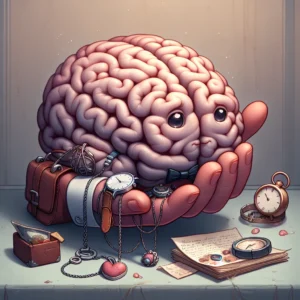Hello, relationship seekers!
In our journey towards understanding the complexities of human relationships, today we’re diving deep into an important question about breakups – “Why does the brain cling to an ex’s possessions after a breakup?”
The Direct Answer
The brain clings to an ex’s possessions after a breakup due to a combination of emotional attachment, habituation, and the psychological discomfort of loss. These possessions serve as tangible reminders of the person and the relationship, triggering the release of neurotransmitters in the brain associated with pleasure and reward. Additionally, the fear of change and the discomfort of dealing with loss make us hold onto these items as a coping mechanism. Now, let’s explore these dynamics further.
1. Emotional Attachment and Memory Associations
The first major factor that makes us hold onto an ex’s possessions is the emotional attachment and the memories associated with these items.
A. Emotional Bonding
Our brains form emotional bonds with people and objects associated with them. Experts in psychology and neuroscience suggest that our brains form these attachments as a survival mechanism. Dr. Jim Coan, a neuroscientist at the University of Virginia, explains that our brains view our relationships as “part of ourselves”. Consequently, the loss of a relationship can feel like a loss of self, and holding onto an ex’s possessions can help mitigate this feeling.
B. Memory Associations
Objects associated with an ex can trigger memories of the relationship. Dr. Art Markman, a cognitive scientist, explains that strong emotional experiences are stored in our memory with great detail. When we come across an object associated with these memories, our brain recalls the emotional experience, making us feel closer to that person.
C. Security and Comfort
These possessions provide a sense of security and comfort after a breakup. According to Dr. Samantha Joel, a relationship scientist, holding onto an ex’s possessions can serve as a transitional object, helping people cope with the loss and navigate their way towards emotional recovery.
2. Habituation and Fear of Change
The second major factor is habituation and fear of change.
A. Habitual Behaviors
Our brains are creatures of habit. Neuroscientist Dr. Ann Graybiel explains that habits form when our brains create a strong connection between an action and a reward. In the context of a relationship, an ex’s possession might be associated with feelings of love and security, making us cling to them.
B. Fear of Change
Change can be intimidating, and it often triggers fear and anxiety. Dr. Heidi Grant Halvorson, a social psychologist, explains that our brains are wired to prefer consistency over change. After a breakup, holding onto an ex’s possessions can provide a sense of familiarity and stability.
C. Coping Mechanisms
Possessions can serve as coping mechanisms during the stressful period following a breakup. Dr. Guy Winch, a psychologist and author, suggests that people often use an ex’s possessions to manage their emotions, alleviate pain, and maintain a sense of connection.
3. Loss Aversion and the Endowment Effect
The third and final factor involves the psychological principles of loss aversion and the endowment effect.
A. Loss Aversion
Loss aversion, a principle in behavioral economics, explains why we hold onto an ex’s possessions. Dr. Daniel Kahneman and Amos Tversky found that people tend to prefer avoiding losses over acquiring equivalent gains. Applied to breakups, this principle suggests that people might hold onto an ex’s possessions to avoid the emotional loss associated with their absence.
B. Endowment Effect
The endowment effect is another principle that can explain our behavior. According to Dr. Richard Thaler, a Nobel laureate in economics, people tend to value objects they own more than similar objects owned by others. Therefore, an ex’s possessions might hold more value to us simply because we possess them.
C. The Role of Time
Time plays a significant role in how long we hold onto these possessions. Dr. Gary Lewandowski, a relationship scientist, suggests that as time passes and people heal from the breakup, they tend to let go of their ex’s possessions.
4. Additional Context and Considerations
While these principles explain why we cling to an ex’s possessions, it’s important to remember that everyone’s experience is unique. The intensity and duration of the relationship, individual coping styles, and personal beliefs can all influence how someone deals with an ex’s possessions after a breakup.
Conclusion: The Definitive Answer
Based on the evidence from neuroscience, psychology, and behavioral economics, we can conclude that:
– Emotional Attachment: Our brains form emotional bonds with our ex and the objects associated with them, leading us to cling to their possessions.
– Habituation and Fear of Change: Our brains are wired to prefer familiar routines and fear change, making us hold onto an ex’s possessions for a sense of stability.
– Loss Aversion and the Endowment Effect: The psychological discomfort of loss and the perceived value of possessions can make us reluctant to let go of an ex’s items.
In essence, we cling to an ex’s possessions because they serve as emotional anchors, helping us deal with loss and navigate change. However, this should be a transitional phase. Holding onto these items for too long can hinder emotional recovery and personal growth. It’s essential to strive for emotional independence and create new memories and habits that support your well-being.



